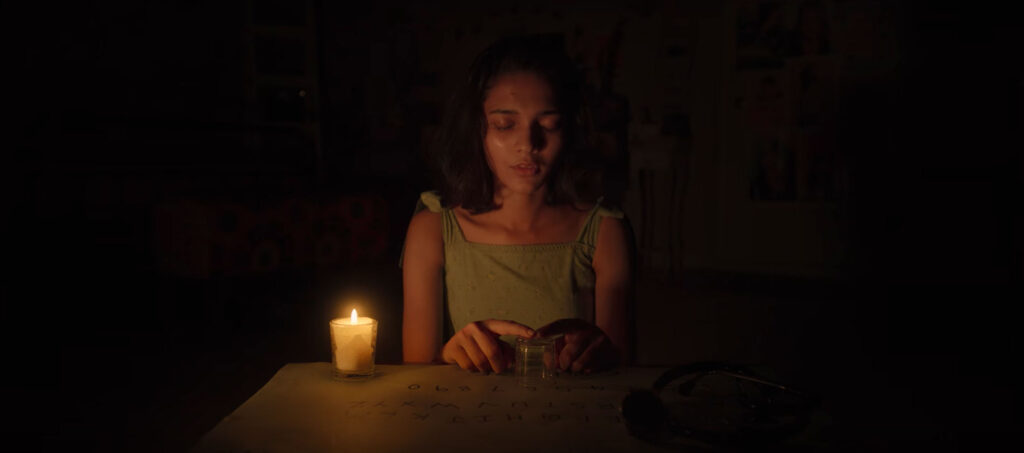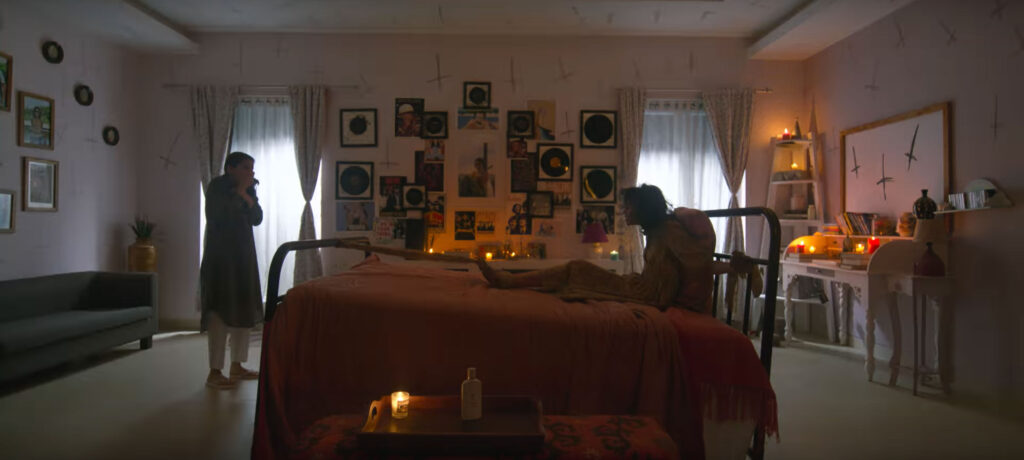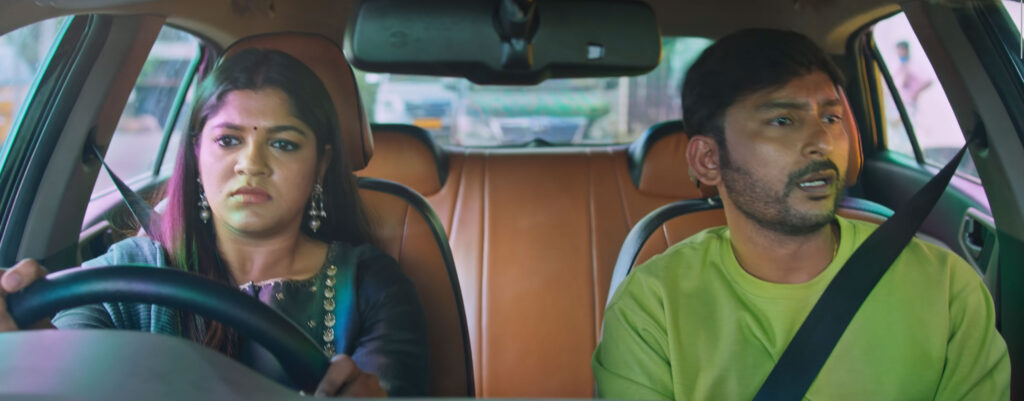December 27, 2022
by Carla Hay

Directed by Ashwin Saravanan
Tamil with subtitles
Culture Representation: Taking place in 2020, in Mahabalipuram, India, the horror film “Connect” features an Indian cast of characters representing the working-class and middle-class.
Culture Clash: During the COVID-19 quarantine lockdowns, a widowed businesswoman finds out that her teenage daughter is possessed by a demonic spirit.
Culture Audience: “Connect” will appeal primarily to people who are interested in watching horror movies that don’t have many surprises but have above-average acting and plenty of suspenseful moments.

“Connect” is not a groundbreaking movie about a teenage girl possessed by the devil. However, this horror flick delivers some effective jump scares and has very good acting, despite the predictable story. The movie excels at creating a foreboding and creepy atmosphere through its cinematography, production design and musical score.
Directed by Ashwin Saravanan (who co-wrote the “Connect” screenplay with Ramkumar Kaavya), “Connect” begins with a deceptively cheerful scene of four family members spending time together on a beach in Mahabalipuram, India. The family members are business executive Susan Joseph (played by Nayanthara), her doctor husband Joseph Benoy (played Vinay Rai), their teenage daughter Anna “Ammu” Joseph (played by Haniya Nafis) and Susan’s father Arthur Samuel (played by Sathyaraj). The adults watch in delight as Ammu, who is a talented singer/musician, plays an acoustic guitar and sings a song for them.
Ammu, who is about 16 or 17 years old, has been accepted into the prestigious Trinity School of Music in London. She’s excited about this opportunity. However, her parents aren’t quite ready for Ammu to live so far away from home. Susan tells Ammu that she can pursue whatever dreams she wants, but the timing has to be right. Ammu can sense that her parents won’t let her go to this school, but something happens that prevents the family from discussing the matter in more detail.
The COVID-19 pandemic comes on in full force, causing worldwide quarantine lockdowns. Joseph is a medical doctor at a hospital, where he has to work long hours during the pandemic crisis and he doesn’t have time to go home. Susan and Ammu communicate with him by videoconferencing. Ammu is considered a “daddy’s girl,” so she is very worried about what will happen to her father being around so many people infected by COVID-19.
Within a matter of days, the family’s worst fears come true: Joseph gets infected, and he quickly dies. The family is devastated by this loss. One night, Ammu secretly goes into a room by herself, lights a candle in front of a Oujia board, and communicates via a video chat with an unnamed woman (played by Mekha Rajan) who claims to be a spiritual medium. Ammu wants this spiritual medium to help Ammu contact the spirit of Joseph.
A ritual is performed. The spirtual medium sings an eerie song that seems to put her in a trance. Suddenly, Ammu’s computer screen freezes, and the room where the spiritual medium is goes dark. And almost immediately, the closed door behind Ammu opens, and Ammu notices that no one visible has opened the door. Ammu gasps in fright. And then the scene fades to black.
The next scene shows Susan on the phone with a doctor to report that Ammu hasn’t been eating or sleeping very well. Susan thinks that she and Ammu might have been infected with COVID-19 but are not showing severe-enough symptoms to go to a hospital. Ammu and Susan have been quarantining, and the only person Susan can think of who might have infected Susan and Ammu is the family housekeeper, who is never seen in the movie.
Ammu then begins to act strangely. She stays in her room for hours and refuses to let Susan inside. By the second day of Ammu appearing to be sick, Ammu refuses to talk to Susan. The rest of “Connect” goes exactly how you think it might go in a movie about a teenage girl plagued by demonic possession.
However, what will keep viewers interested is seeing how what happens during Ammu’s transformation and how Susan deals with it. Because they are stuck in a house together during pandemic lockdowns, it’s not as simple as leaving the house to get help. Similarly, people who could help are reluctant to make home visits during the pandemic. A priest named Father Alex (played by Avinash Yelandur) and a therapist named Sheela (played by Praveena Nandu) are contacted and try to help, but viewers see how Ammu deals with them. (It’s not as cliché as you might think it is.)
There’s also a great deal of the story where Susan has no idea that Ammu is possessed. She thinks that Ammu is going through a mopey teenage phase and grieving over the death of Joseph, until it reaches a point where Susan sees some things that she can’t ignore. It’s one thing for Ammu’s bedroom to have upside-down crosses drawn on the walls like graffiti. But it’s another thing when Ammu starts hiding in dark places and hissing, or when Ammu vomits when Susan makes Ammu drink a glass of water that Ammu doesn’t know has holy water in it.
As shown in the movie’s trailer, Anupam Kher has a supporting role as Father Augustine, the priest who is contacted to perform the exorcism. (Ammu and her family are Roman Catholic.) “Connect” is convincing in how it depicts Susan’s claustrophobic fear of being stuck inside because of quarantining from a deadly pandemic but also feeling like her life is in danger because of the person who’s stuck inside with her.
Nayanthara gets most of the screen time in “Connect” as Susan, but Nafis makes an impessive feature-film debut as Ammu, who becomes a genuinely sinister character. “Connect” director/co-writer Saravanan cleverly keeps Ammu off screen for most of the movie, in order to keep viewers on edge to see when Ammu might show up again and what she might do next. “Connect” isn’t gory by most standards of scary movies. What the movie does so well is show the horror of feeling trapped somewhere with a loved one who has become a monster.
Rowdy Pictures released “Connect” in select U.S. cinemas and in India on December 22, 2022.


